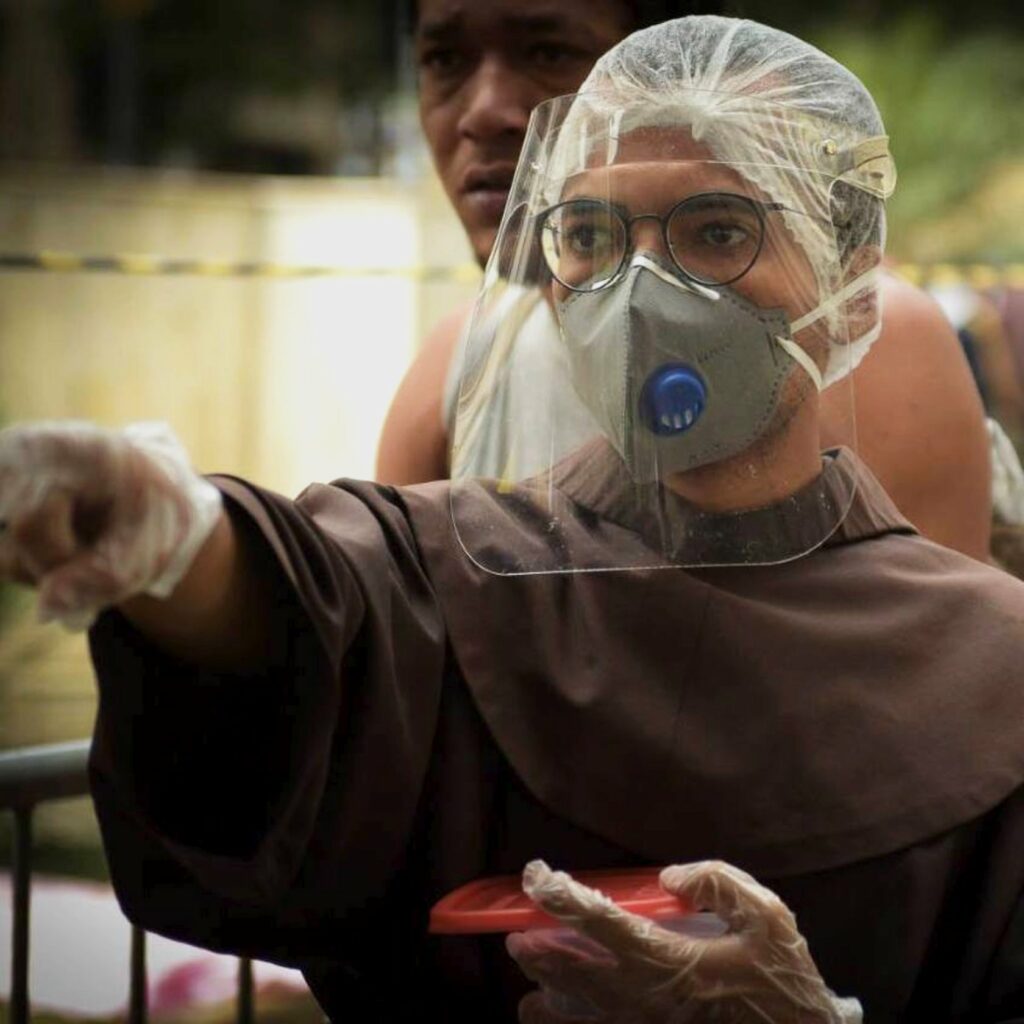In 12 months since our first statements on Covid-19, the Franciscan testimonies we continue to receive show how the pandemic has driven inequality and risks becoming a missed opportunity to adopt the urgent measures needed to address the environmental crisis.
About a year ago, Franciscans International published its second statement on the COVID-19 pandemic, the responses given to it, and their combined impacts on human rights. In that statement, we had chosen to focus on two human rights issues – extreme poverty and environmental justice – that are central to our work, and that of our Franciscan and other partners.
In the 12 months that have passed since then, FI has continued to receive testimonies from its network on how COVID-19 has unmasked and intensified social and economic inequalities, gender and racial discrimination, and other impacts. We also documented how the pandemic has been a missed opportunity to adopt the urgent measures that the environmental crisis is calling for. Choosing this double focus, we were very attentive to the calls for international solidarity and for the need to strengthen rather than undermine multilateralism during these times. FI has analyzed and submitted the information received from partners on the ground to various UN bodies and agencies.
In particular, Franciscan and other partners in Africa, the Americas and Asia-Pacific have shared with us the concrete ways in which individuals and communities who are already marginalized and discriminated against are suffering during this time.
This is true for indigenous people in countries like in Brazil and Guatemala where communities have struggled to access oxygen, vaccines, and their usual means of subsistence including local food markets to sell their harvest, while also being the continued target of repression and intimidation by State and private actors. In Kenya, Franciscans are supporting rural communities that the State is failing to protect against the accumulated adverse impacts of drought, locust invasion, climate change and COVID-19. The current protests that are being violently repressed in Colombia are one of the examples of the refusal, by victims of the pandemic and of the human rights crises it brings about, to accept more inequalities and more economic and social injustices. In Indonesia, the President officially enacted a new law in November 2020, which aims to attract investment and create jobs. This law has been widely criticized by civil society organizations, as it is projected to perpetuate inequalities and negatively affect the ways in which indigenous peoples living in and around forests can access their land and puts them at a disadvantage in relation to corporations with commercial interests, in particular in the West Papua region.
In this context, the blatant lack of international solidarity has been illustrated in several UN debates, including those around access to vaccines worldwide. In addition, we have observed great reluctance by States to express support for the necessity to preserve and strengthen public services like health care or to take human rights compliant approaches in multilateral fora such as those concerning environmental protection.
In the area of the fight for a safe, clean, and healthy environment, and thus truly sustainable development, FI’s second statement warned of States lowering environmental protection standards and climate ambitions. After some promising discourses, especially in Europe, about the need for a paradigm shift and for a “green” recovery, we deplore that many States have instead resorted to the same old recipes to re-boost their economies: increased extractivism and exploitation of natural resources.
This is the case for instance in the Solomon Islands, where the effects of climate change are already being heavily felt and where Franciscans have been denouncing the impact of the booming logging industry. In the Philippines, in April 2021, the President lifted a nine-year moratorium on granting permits to new mining operations, which will escalate the already existing threat against indigenous leaders and environmental defenders. In Brazil, there have been attempts to adopt new legislation that would do away with consultations with indigenous peoples and other communities, and make environmental regulation less stringent. One piece of draft legislation would grant licenses to megaprojects without any environmental impact assessment.1 Within this context, FI and Franciscans in countries like Brazil, the Philippines and Colombia share the deep concerns of broader civil society and social movements about the rising attacks on environmental human rights defenders.
Others, especially developed countries, have given billions away from their recovery packages to big companies who will neither invest in effectively “greener” production nor contribute to establishing more equal societies.2. At the last UN Human Rights Council session in March 2021, FI followed a number of debates that showed how the denial of the triple environmental crisis (biodiversity, pollution and climate) is still present, and leads to a failure to take urgent and bold decisions to curb attacks on our planet and raise ambition to drastically reduce our negative impact on it.
Amidst these several reasons for frustration and discouragement, we at FI have been once again very privileged to work with Franciscans and other partners across the world who are contributing to lessen injustices and to provide spiritual, material and legal aid to their communities. Together with this network, FI continues to ensure, despite the restrictions linked to the pandemic, that the UN system can hear the voices of those living through the most difficult circumstances, who are also actors of change and hope.
Our previous statements on COVID-19 and human rights:
- COVID-19: Extreme poverty and environmental justice (30 April 2020)
- The human rights impact of the COVID-19 pandemic (7 April 2020)
1) See the statement of CIMI (Conselho Indigenista Missionário) on the draft law 3.729/2004: Manifesto contra o projeto de lei que quer acabar com o licenciamento ambiental no Brasil | Cimi accesible at: https://cimi.org.br/2021/05/manifesto-contra-o-projeto-de-lei-que-quer-acabar-com-o-licenciamento-ambiental-no-brasil/
2) See for instance the statement by Olivier de Schutter, UN Special Rapporteur on extreme poverty and human rights, Findings and recommendations after his visit to the European Union, at page 13, accessible at: https://www.srpoverty.org/wp-content/uploads/2021/04/Porto-Social-Summit-Findings-and-conclusions-from-EU-visit.final_.pdf
Photo Credit: © Gustave Deghilage

